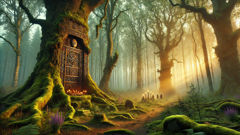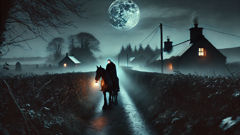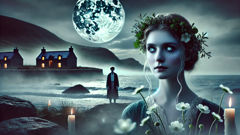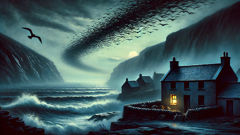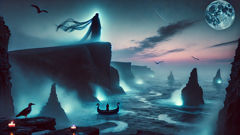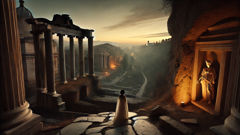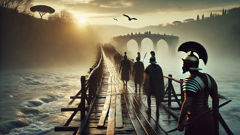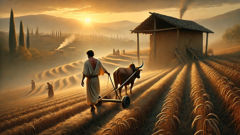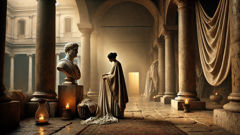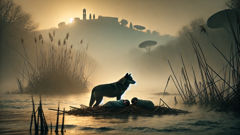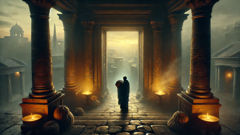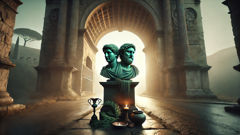Introduction
Beneath the endless canopy of ancient forests, where the Elbe river wound through mist and pine, the world of the Polabian Slavs unfolded—a realm shaped by nature’s rhythms and the hidden hands of their gods. In the days before church bells rang over the thatched rooftops and the cross supplanted the old wooden idols, life pulsed to a different song. The forests were not just timber and shelter but the living abode of spirits: every tree and brook had its warden, every grove its mystery. Through the seasons, the people sowed, hunted, and gathered, guided by customs as old as the land itself. The world was alive with whispers—of Veles, the restless god of earth and water; of Svarozhits, whose fires danced in the village hearth; of the Lady Mokosh, spinning fates by moonlight; and of countless lesser spirits who could bless or curse with a whim.
In these days, the Polabian Slavs gathered beneath oaks so old they seemed to touch the clouds, offering honey and bread to the unseen, seeking favor or forgiveness. The cycle of the year was marked by festivals that honored birth and death, sun and shadow, sowing and harvest—each a thread in the tapestry binding human fate to the will of nature. Their stories were not merely tales for the hearth, but living truths: the gods walked among them in the shape of a bear’s shadow, a wren’s song, or the sudden hush of midnight.
As Christianity crept along the riverbanks, brought by traders, missionaries, and swords, the old ways did not vanish but mingled with the new—sometimes in secret, sometimes in open defiance. Helmold of Bosau, a chronicler from far-off Saxony, listened closely to these fading legends, recording in his 'Chronica Slavorum' not only the coming of the new faith, but echoes of an ancient world. Through his writings, the distant voices of the Polabian dawn survive: not as relics, but as living reminders of a time when forests and spirits shaped the fate of all who dwelled beneath their boughs.
I. The Roots of Creation: The First Song of the Forest
In the earliest days, before the first field was sown or the first hearth was kindled, all was silence—a hush so deep that even the rivers seemed to hold their breath. Out of this silence, according to Polabian myth, came the first murmurings of life. The world’s beginning was not a thunderclap nor a cosmic battle, but a slow stirring—like the gentle unfurling of a fern in spring’s first light. It was the voice of Rod, the primal ancestor, whose breath became wind, whose tears filled the rivers, whose dreams gave birth to earth and sky.
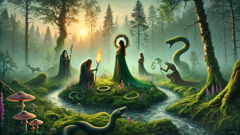
From Rod’s longing emerged his children: Svarog, lord of sky and flame; Veles, the restless wanderer of earth and water; and Mokosh, earth’s patient mother, whose hands shaped every living thing. Svarog cast sparks from his anvil, kindling the sun and stars, while Veles slipped among roots and stones, carving deep rivers and veiling the land in dew. Mokosh sowed seeds in the dark soil, her fingers weaving roots and her hair trailing with wildflowers and wheat. The world, in these stories, was an endless woodland—stretching beyond sight, teeming with creatures both seen and unseen. The Polabian Slavs believed their ancestors first woke beneath these trees, learning to walk, to speak, and to kindle fire by watching the fox and the owl.
But creation was not without peril. The world’s order was fragile, always threatened by chaos—the endless night that lingered at the forest’s edge. In this shadow dwelled Czernobog, the dark one, whose malice was not absolute evil but the necessary night to Svarog’s day. Every sunrise was a victory, every sunset a warning. The Polabians honored both light and dark: bread for Svarog at dawn, whispered prayers to Czernobog at dusk, hoping to keep his hunger at bay.
In their villages, the people told of how the first men and women were shaped from clay and dew by Mokosh, who breathed them to life beneath a moonlit oak. She taught them to till the earth, to honor the streams, and to listen for the voices that rustled in the leaves. In this way, every grove became sacred ground, every animal a potential messenger. The gods’ presence was not distant; they lingered in every shadow, every echo, every change of wind. Creation was ongoing—a balance that could tip with a careless word or an unoffered sacrifice.
From these beginnings, the world of the Polabian Slavs was born: a place where nature’s voice was divine, where humans and gods were bound by a covenant of reverence and fear.
II. Gods of Grove and River: The Spirits of the Sacred Land
As the world blossomed beneath the hands of Rod’s children, the forests of the Polabian Slavs teemed with powers both great and small. In every hollow tree and shimmering stream, spirits watched and waited. The gods were many, their domains overlapping like the roots beneath an ancient oak. For the Polabians, these deities were not distant rulers but constant presences—sometimes nurturing, sometimes capricious, always needing to be honored.
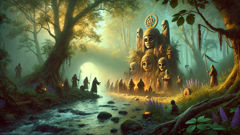
Among them was Sviatovit, lord of war and prophecy, whose great temple rose from the isle of Rügen like a beacon above the waves. His image—a giant figure with four faces—watched in every direction. Warriors sought his blessing before battle, offering honey and mead, while peasants prayed for good harvests and safe journeys. His sacred white horse, kept in secret and never ridden by mortals, was believed to carry omens in the way it moved or fed, its every gesture a sign from the god.
Beside the rivers wandered Veles, whose laughter sounded like distant thunder and whose anger brought floods or disease. The villagers left offerings at riverbanks—fish, milk, or coins dropped into swirling eddies—hoping to appease him. He guarded the boundaries between worlds: life and death, forest and field, village and wild. Travelers whispered his name before crossing a misty bridge or venturing into an unknown wood.
Mokosh, meanwhile, watched over women, weaving, childbirth, and fate. Her shrines were simple: a doll fashioned from straw, a patch of wildflowers left untouched at the forest’s edge. It was she who turned the spinning wheel of destiny, her moods reflected in the weather—gentle rains meant her favor, relentless storms her displeasure. Women called upon Mokosh in moments of fear or hope, trusting her unseen hands to guide their fortunes.
Yet for every great god, there were a hundred lesser spirits—the domovoi who lived in each house’s hearth, mischievous but protective if honored with bread or a kind word; the leshy, wild men of the woods, who led wanderers astray or guarded sacred groves; the rusalki, beautiful but perilous water maidens whose laughter lured the unwary. The Polabian Slavs lived in constant negotiation with these powers. Every festival, every marriage, every harvest was a dialogue between mortal and divine. The year was a wheel of rituals: Kupala Night, when fires blazed and lovers leapt over flames; the autumn feast of Dziady, honoring the spirits of ancestors; the deep winter ceremonies calling back the sun from Czernobog’s darkness.
This tapestry of belief made the world enchanted but unpredictable. The gods and spirits could bring fortune or ruin, joy or grief—depending on the care with which they were honored. To live in these lands was to accept that nature itself had a will, that every shadow might conceal a watching presence, and that humanity’s place in the world was humble, grateful, and always aware of the unseen.
III. Twilight on the Elbe: The Passing of the Old Gods
The centuries turned, and with them the fortunes of the Polabian Slavs. Along the Elbe’s banks, new forces gathered: traders from distant Frankish cities, missionaries bearing crosses and books, and warlords hungry for new lands. Change crept quietly at first—a rumor, a foreign song echoing down the river. But soon church towers rose where groves had stood, and the stories of the old gods became whispers, then secrets, then half-remembered dreams.
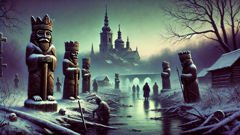
The chronicler Helmold of Bosau wrote of this transformation with both fascination and regret. He watched as the people clung to their ancient ways, even as baptismal fonts replaced sacred springs. In many villages, the two worlds coexisted uneasily: on Sunday mornings, villagers attended mass in stone chapels; by moonlight, they left bread and honey at old idols hidden deep in the woods. The gods did not disappear overnight. Instead, their images faded into the grain of old doors, their names spoken only in riddles or lullabies. The sacred groves were cut down for timber or plowed under for fields, but in the hush before dawn, some claimed to hear Svarog’s fire crackle or Mokosh’s voice in the rain.
Yet for all its sorrow, this twilight was not an ending. The Polabian Slavs carried fragments of their old faith into the new world. Rituals survived—transformed, perhaps, but enduring. Children wore amulets carved from rowan wood; elders told tales of spirits who still haunted riverbanks and crossroads. Festivals that once honored Veles or Sviatovit became saints’ days or folk celebrations. The land itself—its rivers, forests, and stones—retained its magic, bearing silent witness to the world that had been.
In this fading light, stories became a shield against oblivion. The legends recorded by Helmold did not capture every nuance or mystery, but they preserved enough for the curious and the dreamers. Through them, the old gods lived on—not as distant deities demanding sacrifice, but as symbols of a world in which nature and humanity were bound together by wonder and respect. The Polabian Slavs vanished into history’s river, but their stories remained, echoing in the whisper of leaves and the rush of water beneath ancient oaks.
So it was that the Chronicle of the Slavs became not just a record of conquest or conversion, but a living bridge—a path for all who wish to remember what it means to live with the sacred at every threshold, to honor both light and darkness, to walk humbly beneath the trees and know that every step is watched by unseen eyes.
Conclusion
Long after the last sacred grove fell silent and the idols crumbled into moss and dust, something of the old world lingered in the Polabian lands. The echo of ritual fire and the hush of dawn beneath ancient trees left their mark on every field and pathway. Even as faiths changed and new rulers came and went, the people carried forward a reverence for earth and water, an understanding that life and nature are intertwined. The Chronicle of the Slavs is more than a memory of vanished gods—it is a call to listen for the voices that endure beneath the noise of history. Every river still glimmers with unseen presences, every forest still hums with ancestral songs. In this fragile world, where darkness and light forever balance, the old stories remind us to honor what cannot be seen but can always be felt: the living spirit of the land, and the hope that with each new dawn, we too might hear the first song of creation in the whispering leaves.

